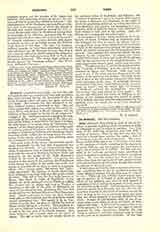

Debbora, prophetess and judge; she was the wife of Lapidoth and was endowed by God with prophetic gifts which secured for her the veneration of the divided Israelitic tribes and gave her great authority over them. Her wisdom was first displayed in settling litigious matters submitted to her: “She sat under a palm-tree, which was called by her name, between Rama and Bethel, in Mount Ephraim, and the children of Israel came up to her for all judgment” (Judges, iv, 5). Debbora was thus a judge in the ordinary sense of the word. In the case of the other persons whose history is recorded in the book of Judges, the title seems to be given them as “deliverers and leaders” of the chosen people, no mention being made of ordinary judicial functions; but it was rather the confidence inspired by Debbora in the discharge of such functions which enabled her to bring about the deliverance of the nation, which was then suffering under the oppression of the Chanaanites.
The main army of the enemy was rendered particularly formidable by the fact that it possessed nine hundred iron chariots. It was commanded by Sisara, whose headquarters were at Haroseth, probably identical with the actual el Haritiyeh, between Haifa and Nazareth, on the banks of the Nahr Muquatt’a (Cison) in the plain of Esdraelon. Occupying this position in the center of the country, the Chanaanites could harass the tribes to the north and south, and render it very difficult for them to unite in a common effort. For “twenty years” the enemy had “grievously oppressed” the children of Israel, when Debbora declared it was God‘s will that His people should be freed. This will of God she first made known to Barac, who dwelt in Cedes of Nephthali, today Qedeis, one of the principal ruins of Northern Galilee.
She charged him to gather and lead to Thabor, a mountain to the east of the plain of Esdraelon, an army of ten thousand men, promising him that God would deliver into his hand Sisara and the Chanaanite army. Barac undertook to carry out those instructions only on the condition that the prophetess herself should accompany him. She agreed to do so, foretelling, however, that the glory of ridding the land of Sisara would belong to a woman. This prophecy refers not to Debbora herself, but to Jahel whose story is told in the last part of the fourth chapter. Debbora, however, did certainly share in the glory of Barac. The call to battle was not merely issued to
W. S. REILLY.

